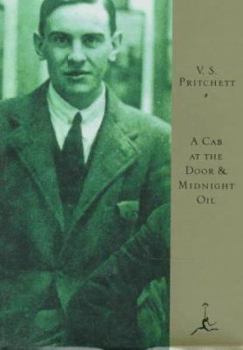A Cab at the Door & Midnight Oil
Select Format
Select Condition 
Book Overview
A Cab at the Door, originally published in 1968, recalls his childhood in turn-of-the-century and World War I London with the urbane subtlety and wry humor that have marked his other works. For the... This description may be from another edition of this product.
Format:Hardcover
Language:English
ISBN:0679601031
ISBN13:9780679601036
Release Date:July 1994
Publisher:Modern Library
Length:431 Pages
Weight:1.10 lbs.
Dimensions:0.8" x 5.7" x 8.3"
Customer Reviews
3 ratings
Pritchett's Progress
Published by Thriftbooks.com User , 14 years ago
These two autobiographical narratives are written with such a tripping tongue and Pritchett's life itself is such a jaunty narrative: part immense travelogue (Paris, Andalusia, Ireland, the Appalachian hills in America) but, mostly, the continuous inward struggle with becoming a writer, that it's hard to imagine anyone disliking these convivial, self-deprecatory narratives, especially struggling writers and literati of all stripes. But I had my doubts at first. In fact, if I were only reviewing A Cab At The Door, this would indeed be a very different sort of review. It is an account, with wry bits of Yorkshire humour, of Pritchett's youth in lower middle Class Edwardian England and the influence of a Christian Scientist father and disbelieving mother. I realise - after reading Midnight Oil - how essential it is to have this background in coming to an understanding of Pritchett. But, for all Pritchett's stiff upper lip concerning his disadvantages, it makes for a rather depressing read. But then Pritchett departs from kith and kin, taking off for Paris in Midnight Oil. It must be said that, aside from a few jokes which you must know French to understand, Paris is not too much fun to read about either, but at least here we have the faint glimmerings of an independent spirit beginning to take flight. As he leaves Paris, Pritchett asks himself what he has learned, and answers himself: "I had learned to be absurd, was willing to see what happened to me." And so he does when he goes to write about Ireland. This first trip to Ireland, where he meets Yeats - "He was the only man I have known whose natural speech sounded like verse." - and other Irish literary luminaries, he falls in love with and becomes enchanted by the grandeur and folly of the Emerald Isle and its inhabitants. This is the most winsome and coruscating part of the whole narrative, I should say, especially after reading of the material and spiritual deprivations the author has endured hitherto. Spain - as it was in the 1920s - clearly had the most influence on Pritchett's literary and personal development, but he leaves out a great deal - so he says - because he has covered them in other works. Still, the reader is stricken by the wide, barren landscapes Pritchett describes and the deep respect he comes to feel for the poverty and Stoicism of the proud intellectuals he comes to know there, many to die a decade later in the Civil War. Despite the novels and short stories Pritchett produced, it is well to remember that Pritchett won fame as a literary critic. And it is as a literary critic that he is primarily remembered. Towards the end of Midnight oil, Pritchett reflects: "In my criticism, perhaps even more than my stories, I am self-portrayed. When I reread those essays written in such numbers over the last thirty years, I am surprised to see how much they are pitted with personal experience....In penetrating to the conflicts of authors, I have discovered and refle
Cab @ The Door & Midnight Oil, Two Pleasures in One Volume
Published by Thriftbooks.com User , 16 years ago
A wonderful single volume Modern Library edition of Pritchett's two volumes of memiors, Cab at the Door and Midnight Oil. Cab at the Door covers Pritchett's life from before birth to age 18. It is by turns: engaging, enlightening and laugh out loud funny. A good picture of post Victorian/Edwardian England. Pritchett's easy, self-depricating style keeps this poverty coming of age story from becoming another Mein Kampf (my struggle). Midnight Oil is even better and was rightly called "A little Rolls Royce of a book." by Wilfred Sheed when it came out in 1972. The best and probably most realistic portrait of Paris in the 20's I've read. Very readable and important to anyone that wants to understand how a writer came to be. The pages fly by. I highly reccomend this Modern Library edition. Complete Collected Stories
autodidact, out of chaos
Published by Thriftbooks.com User , 23 years ago
VS Pritchett has written a splendid two-volume autobiography, which covers his childhood through his initiation as a writer. It is beautifully written and hilariously funny in places.His early life was rather chaotic, both as a Christian Scientist and because of the ups and downs of his father's business, which meant they were frequently poor and the the children farmed out to grandparents. What is remarkable is his rise, from voracious reader to first-rate literary talent. Blocked from admission to university because he was put on a "craft" track in the leather trade, he gave it up and went abroad, the next best thing to a degree. In Paris as a semi-bohemian, he started writing, which led to jobs and a career.His descriptions are so marvelous that I have remembered some of them for over 20 years. While a child writing for public-library event, he said he wrote the words so that they would "burn into the table" (if memory serves!); the essay was so good that the teacher thought he was really a professional writer. Nothing spectacular, but a first-rate story of coming of age. I recommend it for any aspiring writer who wants to feel that some order might emerge from his/her chaos of early hopes. ALso for the literarati, it is the emergence of an unusual mind.





